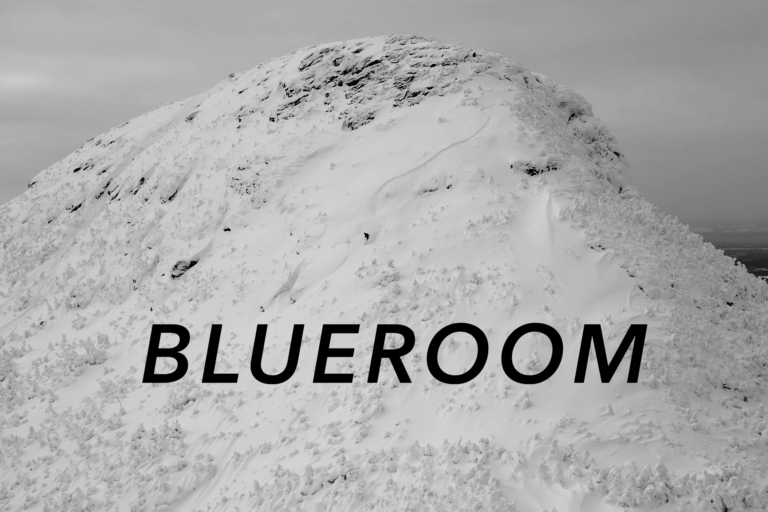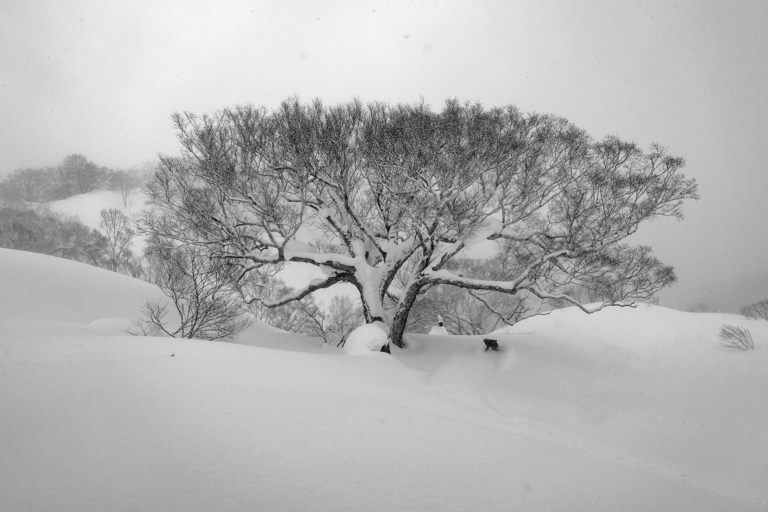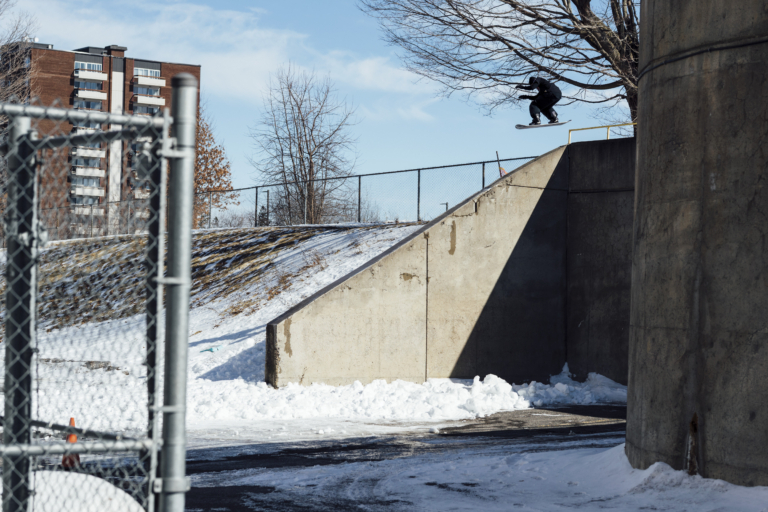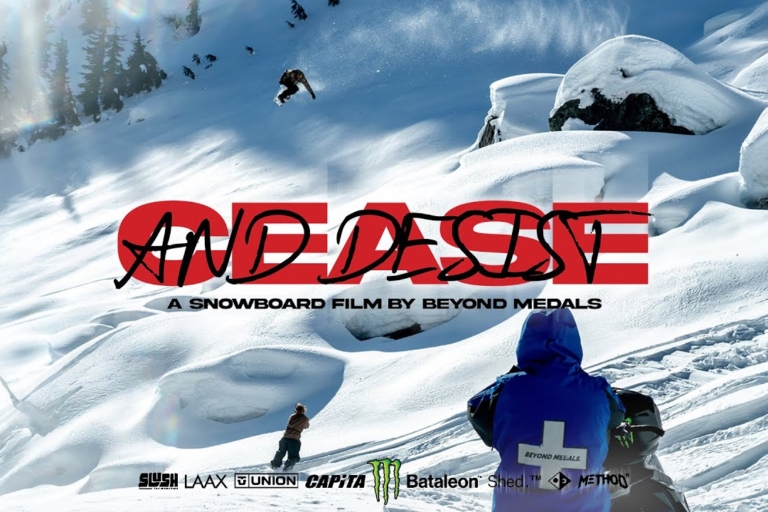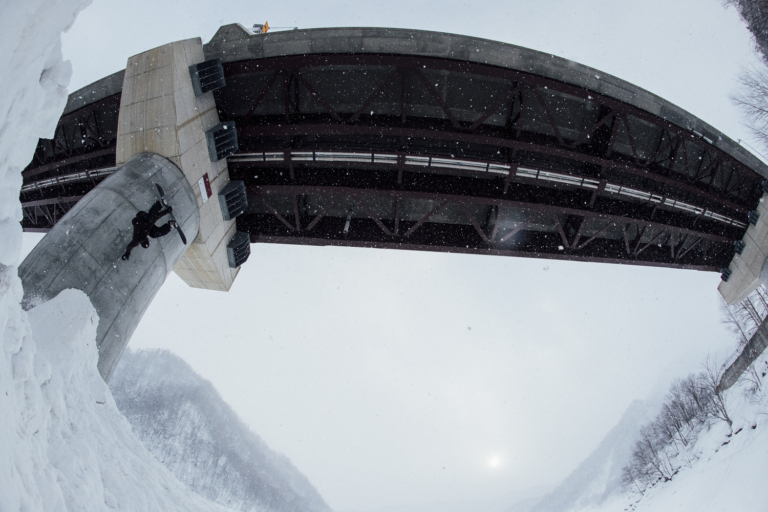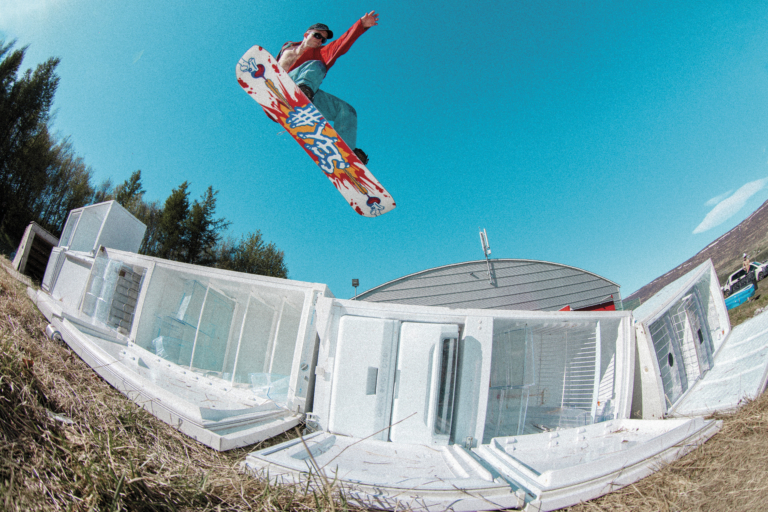I first met Jordan Hall over email, many years ago. He is one half of the Doing Business Agency, which handles the sales in Western Canada for Salomon, 686, SPY, and Glove (Jordan breaks down the specifics below) and as such, he is unwaveringly committed to and involved in the snowboard community in the region. When I was online editor at Snowboarder, Jordan would regularly send over video submissions from the local crews, introducing me to SRD, Oil Country, and many of the players in the Alberta snowboarding scene over the years. This wasn’t anything Jordan “had” to do for work, it’s just what Jordan does–lift other people up and support those around him in any way he can. This is a double-down on what defines his role in the industry: making connection. Sure, a dictionary definition of working on the sales side of a brand is literally getting product into shops and into consumers’ hands, but that’s a huge oversimplification of how essential sales reps are in general, and how integral Jordan is, in specific. At the foundation of what he does is connecting brands to consumers through physical product: linking snowboards, outerwear, and accessories from creator to user through brick and mortar. But what this enables in a larger way is connecting, creating, and strengthening the community on a local and regional level through support, events, projects, team, and then some. And importantly, this is the grassroots level that is most impactful for all of us, as it’s what we interact with every day and every season.
Based in Calgary, Jordan is a constant presence that supports and catalyzes the riders and industry members around him. Years after corresponding on email, I finally got to meet him in real life and experience his dedicated, passionate, and analytical approach to our industry in person. Jordan is always thinking about possibility, be it when riding or when supporting riders, and his love of snowboarding, combined with his drive, continually moves the needle forward in snowboarding, both in Western Canada and beyond. – Mary T. Walsh
Name: Jordan Hall
Stance: Regs. 15/-15. 23.5” wide
Job title: Sales for 686, Salomon Snowboards, SPY, Globe
Where you’re from: Edmonton, Alberta
Where you live: Calgary, Alberta
Home Mountain: Sunshine Village
Instagram: @doing_business
What is your current job and can you tell us a little bit about what your role entails?
I own and operate the Doing Business Agency with my partner Dustin Adams and our team member Brandon Pedersen. We handle all of Western Canada for Salomon Snowboards, 686 Outerwear, and Globe, and Alberta/Saskatchewan/Manitoba for SPY Optic. We’re responsible for the sales, support, and promotion of these brands in the territory.
What does a typical day at work look like for you?
Haha, I feel like there’s an ever-evolving definition of “typical,” especially over the last few years. A typical office day starts at 8am with a giant cup of coffee, catching up on any to-do list from the day before. Getting some legwork out of the way before stores open helps to free up time to focus on any issues the day will bring. This is usually when we’ll check reports and prep the daily available-to-sell lists. We do a lot of internal tracking and monitoring, so making sure that all lines up is important. Once the shops open, it’s a mix of calls/texts/emails addressing the needs of our accounts.
During sell-in or peak season, that changes dramatically. With our brand mix, we have several different prebook cycles throughout the year, each requires in-person or digital meetings and communication to present the new ranges. For example, the peak winter season for us starts in September with product shipping into stores, which is when we’ll start our PK tours. These sessions usually take us until December to complete, and since we cover half the country, time management is crucial. During this time, we’ll be juggling the usual daily workload of at-once sales, addressing logistical and other issues, receiving the next season’s samples, and setting up showing plans for the upcoming sell-in of all brands. Full showing season kicks off at the end of November and will run until deadlines are wrapped around February/March. During that time, we’re balancing daily tasks, showings, order follow ups, as well as prebook order entry and confirmation… all while trying to sneak in personal ride days. The typical winter usually includes as many consumer-facing demos as possible, and if you slot in sales meetings for all our brands, you’ve got a busy season.
As the fall/winter sell-in cycle is winding down in March, the spring/summer cycle is ramping up. As we’re wrapping up snowboard, outerwear, and goggle prebooks, we’re also shipping in footwear, skateboards, apparel, sunglasses, dealing with at-once needs, and addressing issues as they come up. With the crossover between seasons, this makes time management extra important. Summers are a mix of office days and road laps, making sure that our accounts have everything they might need. We’ll start selling in the future spring ranges in June/July, and that brings another round of trade shows and road laps. Deadlines are usually mid-August, which is also when we’ll start the planning for the upcoming winter, and then the cycle starts over again.
Pre-pandemic we were on the road a ton, doing our best to split up and cover the territory. During the lockdowns we had to pivot and spent a lot more time in the office. Time on the road is something that I certainly missed, so I’m very glad we’re able to get back out there and work face-to-face with our accounts.
How did you start snowboarding?
I grew up in Edmonton, and we were lucky to have some really fun local hills, as well as a couple mountains within a four-hour radius. I started boarding in my teens, spending as much time as possible at the locals, and doing day trips to Marmot Basin, Sunshine, or Lake Louise. As soon as my attempt at a hockey career ended and I finished high school, I packed up and moved to BC.
When did you know that you wanted to work in the snowboard industry?
It was very clear early on that while I loved snowboarding more than anything, I was kind of a hack, never good enough to make it as a rider. I think it was my first southern-hemisphere experience that opened my eyes to the business side. I had a few friends that worked in shops, and while I was toiling away in warehouses and factories, they got a chance to do what they loved. Returning from a few back-to-back winters, I found myself in a pretty decent financial hole. I went to work in the oilfield for a time to try and catch up, and while the work was challenging (and the money was amazing), I found myself completely and totally fixated on snowboarding. I ate, breathed, slept, and dreamt about riding… it’s all I wanted to do. I decided then and there that it was a path I wanted to pursue.
What was your first job in the industry?
My first job in the industry was working for a local snowboard and bike shop. It started off as a sales position, but then transitioned into buying. This was my first intro into the sales/prebook cycles and gave me an understanding of the sales and buying processes.
Between that first job and now, how did you get to where you are currently?
I was extremely fortunate, just as I made the decision to leave my buying position and finish up some schooling, I got a call from Dustin. He’d just left a sub rep position with another brand, picked up some product lines on his own and needed some help. He knew I was insanely passionate about snowboarding and together we formed what is now the Doing Business Agency. It’s crazy to think that was thirteen years ago now.
For the first couple years, I was attending college full-time, working as a sales rep, and doing my best to not screw up at both! I somehow managed to come away with a solid GPA, and a job that I absolutely loved. As soon as I finished school, I packed up and moved back to the mountains to be closer to what I loved most.
Over the years, we’ve been fortunate enough to work with some truly amazing brands and had to make some very difficult decisions about what would work best for our agency. It was always important to us to build a brand mix that would keep us busy year-round, while working within the reality of our time constraints. The last thing we’d ever want to do is over commit and under deliver to either our brands or our accounts. We’ve found a great balance and we’re honored to be a part of the Globe, Salomon, 686, and SPY families!
What experiences or lessons have been most valuable to you to get to where you are?
There’s been a couple doozies along the way, but I think the ones that stuck with me most were:
You’re going to make mistakes, shit will happen. Accepting this and focusing on solutions will determine the severity.
This one’s a work in progress:
Work/Life balance. It wasn’t until I met my wife that I started to wrap my head around the importance of taking time to put yourself first. Both for your physical and mental health.
What do you feel are some of the most important skills or areas of knowledge necessary for your current role?
First and foremost, passion for the industry. The real job isn’t glamorous and requires a ton of work. You really need to love what you’re doing to dedicate the necessary time to it. Next would be a strong work ethic. We were fortunate in that we started with smaller brands, so the only way to succeed was through hard work, and we pride ourselves on keeping that same mentality today. Strong communication and organizational skills are also vital. Thorough knowledge of the products, both yours and the rest of the industry. Time management and scheduling skills to make sure you’re being efficient and effective. It’s also vitally important to be computer savvy and have a solid grasp of all of the tools at your disposal. Last but not least, the ability to drive through the night and work all day helps too.
What is a skill that you didn’t necessarily think would apply to your current role, but has proven to be invaluable?
Automotive maintenance! With all the time spent on the road, the vehicle costs can add up fast. We had some years where I was averaging over 50,000 km, so I started doing my own basic maintenance as way to keep expenses down. This turned into somewhat of a hobby for me too and now I’m splashing in some performance upgrades. I figured I’m spending so much time in my vehicle, it might as well be fun to drive.
What is a challenge in your current role that you didn’t expect and that you have had to navigate?
The low-hanging fruit here is certainly the pandemic, but I’m going a little more personal with this one… INJURIES. Being passionate about snowboarding comes with the inevitability that you’re going to get hurt, especially as we get older. Being able to recover from these injuries, mentally and physically, while continuing to operate at the same level is no small feat. In my case, I suffered a pretty serious back injury that required two spine surgeries. This type of injury is the kind that rattles you to the core, permanently alters you, and does a number on your physical and emotional state. It raised a lot of questions about my future in the industry, and my ability to ride at all. I knew that if I couldn’t ride, it’d be torture to continue doing this job having to watch from the sidelines. With the help of my wife, Dustin, our family and friends, and the best physiotherapist in the world, I worked my ass off to get back on snow. It took a year-and-a-half, but those first few turns were the greatest feeling. I cried, literally. I’ll never forget that day.
We’ve all been hurt, but learning how to adapt and keep trucking without disrupting the flow of the business is always a challenge.
How do you deal with the set-back professionally?
Tying it back to above, from a professional standpoint, Doing Business didn’t skip a beat. I think I took four days off total after the surgeries. We shifted the workload between the two of us to cover off everything that was needed at the time. Dustin took on more of the travel and road work, and I spent more time on the phone and answering emails during my recovery. We’re very fortunate that we’ve always been able to shuffle the workload and pick up each other’s slack when required. There’s a great balance within our partnership. Both of us have our specific skillset we excel in, but we’re also able to handle what needs to be done individually. The main focus is always to ensure that all our accounts are getting the necessary support, and we’re fulfilling our obligations to our brands, no matter what’s going on in our personal lives.
Who and/or what do you look up to in the industry for inspiration?
Anyone that points their board downhill and does it for the love of it! I find inspiration in anyone that’s sliding sideways with a smile on their face, no matter how old you are, or what you’re doing.
What do you feel has been your biggest impact in your area of work?
One of the things I love most about this job, is being able to help people and spread the love of snowboarding. We’ve got a rather large family within our agency. It’s made up of friends, shop staff, ambassadors, riders, just a solid group of like-minded humans that genuinely love to board. I’d hope that if I’ve had ANY impact, it would be that I’ve been able to help make their seasons more fun and help them progress in the industry.
What keeps you driven and motivated in your line of work?
At the risk of sounding like a broken record, the love for the industry. I genuinely love what I do, and I’m grateful to be involved in snowboarding. But also, seeing our brands succeed and grow. I take an immense amount of pride in seeing our products in the wild. It’s incredibly rewarding that people chose to buy/wear/ride gear from the brands we represent. This industry is constantly in flux, trends change, and everyone makes great product, so you’re constantly pushing to find a place in the mix. The fact that someone would spend their hard-earned cash on some of our stuff is a driver for sure.
I’m also a major gear nerd so it’s incredible that we’re able to chime in and help shape and test future products. I’m still like a kid on Christmas every time I see a new catalog or unpack new samples!
Working in snowboarding is a wonderful, yet often complex combination of our personal passion and professional life. How has this come into play in your experience working in the industry?
I couldn’t have said it better. In my experience, the personal passion is essential to a successful professional life. It’s an ongoing desire for knowledge and experiences that come from being truly passionate, that creates the element of constant self-improvement and humility needed for a shot at being successful. The part that can be difficult is finding a work/life balance to avoid burning out. Losing that passion will negatively affect the drive and motivation, and people can see that. Making sure I’m taking time to get out and cut some laps for myself is what keeps me level. During the pandemic when things were extra spicy, my wife and I started a tradition of Sunday sessions with our friends. We’d meet out at Sunshine Village every week and just go cruise, no matter the conditions. This gave us at least one day a week where we’d be able to decompress and goof around. Even if I’d ridden multiple days leading up to it, and my body wasn’t happy, those sessions were always full of smiles. This tradition has continued for a couple years now and is always the highlight of my week.
If someone was interested in doing what you do, what would you recommend they pursue to reach this goal?
It’s difficult to break into the wholesale side of the industry, but I think having an understanding of retail sales and buying is the crucial first step. Knowing what it’s like to deal with all types of customers, work the floor during the holiday chaos, go through a buying cycle, budget and sales planning, dealing with deadlines, and then have 100 different reps hounding you for orders… these are real world experiences that contribute to a well-rounded understanding of the everyday demands.
Post-secondary is certainly useful, but I think it’s more about the experience than the paper. Sure, you absolutely need to know how a business operates and be computer savvy, but these are skills and knowledge that can be learned. It’s not like you can go to school for a degree in “snowboard.” It’s the social skills, written and verbal communication, an outgoing personality—these aren’t easily taught. Being a student of snowboarding is also important. Knowing the past and present when it comes to tech, trends, riders, video parts, etc.
Overall, the best advice I could give here is build relationships with sales reps in the industry. Go for some laps, help them turn screws at a demo, offer help with sample sales/trade shows/showings, support their brands, be a friend. Jobs don’t come up often, but when they do it’s great to have made those connections.
Lastly, best piece of advice someone has ever given you that applies to your professional life that could be helpful for someone reading this?
Do what you love and you’ll never work a day in your life.
Follow Jordan on Instagram at @doing_business.
So you want to work in snowboarding? There are many avenues you can pursue in the snowboarding industry and in new online series, Clocking In, we seek to highlight individuals whose professional lives are defined by their dedication and contribution to snowboarding through their 9-to-5. Not that the term “9-to-5” is very accurate in boardworld, as you will see in these interviews, but that’s not necessarily a bad thing. After all, Steve Jobs famously said, “The only way to do great work is to love what you do.” It’s a pretty special thing to be able to merge passion with profession, so not only are these individuals doing it in really rad and impactful ways deserving of accolades, but they also are here to share what they’ve experienced so if you’re aspiring to join the ranks on the industry side (we can’t all have the athletic skills necessary for an energy drink sponsor), here’s some insider info to help you on your way.

